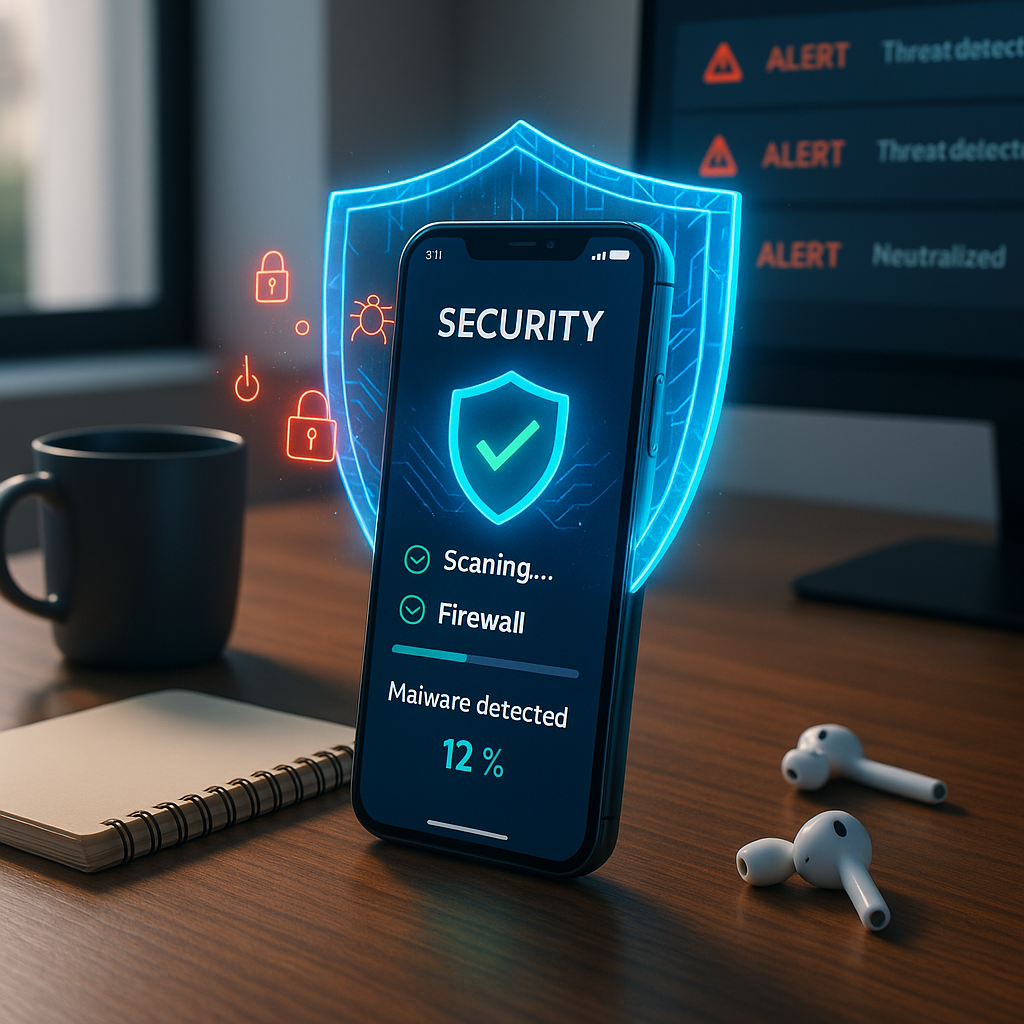Key Takeaways
- Top free apps deliver robust protection at zero cost. Leading antivirus apps now offer comprehensive malware detection, real-time scanning, and anti-phishing features for free, making premium security accessible to everyone, regardless of budget.
- User trust matters. Choose highly rated, reputable brands. Opt for security solutions developed by established companies with strong user reviews and transparent privacy policies to ensure your device stays protected without hidden risks.
- All-in-one protection extends beyond viruses. The best security apps offer more than just virus scanning. They include extras such as safe browsing, Wi-Fi monitoring, anti-theft tools, privacy advisors, and more, providing holistic device defense.
- Minimal impact on battery and performance. Quality free antivirus apps are designed to run quietly in the background, preserving your device’s speed and battery life while constantly safeguarding your data.
- Real-time updates defend against emerging threats. Top apps frequently update their malware databases, delivering up-to-the-minute protection against the newest threats targeting Android and iOS devices.
- Easy setup, seamless experience. Leading security apps feature intuitive interfaces, hassle-free installation, and automatic protection, making them ideal even for non-technical users seeking straightforward, effective security.
- No hidden costs means truly free peace of mind. Watch out for intrusive ads or aggressive upsells, but rest assured that the best free antivirus apps genuinely offer core protection without surprise charges or paywalls.
Armed with these insights, you are better equipped to select the right free antivirus app for your needs. By balancing security, usability, and genuine value, you can protect your data and browse safely with confidence. Now, let’s explore the standout options and the unique strengths each one brings.
Introduction
Your smartphone is now the keeper of your messages, photos, financial accounts, even your location history. As mobile devices become our primary tools for work, entertainment, and communication, the risks they face multiply. Cyber threats are released daily, making robust, real-time security non-negotiable.
The good news is that you don’t need to spend a fortune for effective protection. The right free antivirus app gives you a strong layer of defense, keeping your personal data safe without slowing you down or emptying your wallet. The top options offer more than virus scanning. They help find lost devices, protect your online activity, and warn you of dangerous networks. Let’s uncover the best free antivirus apps on the market and what makes them the smart choice for mobile security.
Why Mobile Security Matters in Today’s Digital World
Our mobile devices have evolved into digital vaults, housing everything from sensitive emails to payment details and private conversations. Security threats have rapidly kept pace with this evolution. In fact, recent studies show that mobile malware attacks surged by 50% in 2022, and the average cost of a single data breach reached $3.86 million. The stakes are high: leaving your phone unprotected puts not just personal, but also professional and financial data at risk.
Un passo avanti. Sempre.
Unisciti al nostro canale Telegram per ricevere
aggiornamenti mirati, notizie selezionate e contenuti che fanno davvero la differenza.
Zero distrazioni, solo ciò che conta.
 Entra nel Canale
Entra nel Canale
Recognizing the value of mobile security isn’t just about protecting the device itself. It’s about preserving the integrity of your digital life. As mobile usage eclipses desktop in many industries (in healthcare for telemedicine, in finance for mobile banking, and in education for e-learning), protecting these devices becomes essential for individuals and organizations alike.
Understanding Mobile Security Threats
As the mobile landscape grows, so do the threats targeting users. Awareness of these risks is the first step toward effective protection.
Common Mobile Security Risks
- Malicious Apps: Fake or tampered apps disguise themselves as useful tools but covertly steal data or take control of devices. Healthcare professionals, for example, risk exposing sensitive patient data if they install unauthorized medical apps.
- Phishing Attacks: Sophisticated scams use SMS, emails, or instant messages to trick users into divulging confidential information or installing malware. Financial institutions have seen a spike in mobile banking phishing attempts, costing users and banks millions.
- Network Vulnerabilities: Connecting to unsecured public Wi-Fi exposes your information to interception, putting sensitive work correspondence, account logins, and even classroom activities at risk.
- Ransomware: Mobile-specific ransomware variants can lock out users from their devices, demanding payment to restore access. Both small businesses and individual users are frequent targets due to their perceived lack of security protocols.
How Mobile Antivirus Works
Modern mobile antivirus apps provide layered protection to counter the diversity of threats.
- Real-time Scanning: Newly installed apps and files are immediately checked for malicious activity.
- Behavioral Analysis: Ongoing monitoring identifies suspicious actions by apps, such as unauthorized access to contacts or sensitive data.
- Web Protection: Detects and blocks visits to dangerous websites, protecting users as they browse or access links in messages.
- System Optimization: Some solutions incorporate cleanup and performance tools to ensure that security doesn’t come at the cost of device speed or usability.
A multi-layered defense approach strengthens protection for users across all industries, including retail with mobile payment systems, education with student portals, and marketing platforms collecting behavioral data.
Top Free Antivirus Apps Reviewed
The mobile security market brims with options, but not all apps are created equal. Here are the standout free antivirus apps, reviewed for features, performance, and privacy considerations.
1. Avast Mobile Security
Key Features:
- Real-time malware detection for immediate threat response
- Wi-Fi network security scanner, ideal for assessing public hotspot risks
- Anti-theft tools to help locate or remotely wipe a lost or stolen phone
- Photo vault for securing private images
Performance Impact: Minimal, with only 2-3% battery usage.
User Experience: Intuitive interface, easy to navigate for all user levels.
Privacy Consideration: Some data collected from free version users, outlined in privacy policy.
2. AVG AntiVirus Free
Key Features:
- Robust anti-theft tracking for lost device recovery
- App lock to secure sensitive apps with a password or fingerprint
- Performance optimization tools to clean junk files and free up space
- Camera trap snaps photos of intruders after failed unlock attempts
Performance Impact: Low, averaging 3-4% battery use.
User Experience: Streamlined, beginner-friendly setup.
Privacy Consideration: Shared infrastructure and security features with Avast.
3. Bitdefender Antivirus Free
Key Features:
- Ultra-light cloud-based scanning for rapid malware detection
- Extremely low system impact, making it ideal for older devices
- Autopilot feature delivers security recommendations without manual intervention
- Web protection guards against phishing and malicious URLs
Performance Impact: Among the lowest, just 1-2% battery drain.
User Experience: Minimalistic and straightforward, focusing on essential security.
Privacy Consideration: Limited data collection and clear privacy commitments.
4. Kaspersky Mobile Antivirus
Key Features:
- Proactive real-time protection that updates frequently
- Advanced anti-phishing blocks fraudulent links and messages
- Call blocking for unwanted or spam calls
- Find My Phone feature assists in locating lost devices
Performance Impact: Slightly higher at 4-5% battery, yet optimized for most devices.
User Experience: Feature-rich, which may take some acclimatization for novices.
Privacy Consideration: Strong record of transparency and privacy protection.
5. Norton Mobile Security
Key Features:
- App advisor rates the privacy and security of installed apps
- Wi-Fi protection warns against unsafe networks
- Web protection against potentially dangerous sites
- System advisor helps optimize device settings for advanced users
Performance Impact: Moderate to high, at 5-6% battery usage.
User Experience: Sleek and premium, even in the free version.
Privacy Consideration: Some restrictions on features in the free plan.
6. Malwarebytes Security
Key Features:
Un passo avanti. Sempre.
Unisciti al nostro canale Telegram per ricevere
aggiornamenti mirati, notizie selezionate e contenuti che fanno davvero la differenza.
Zero distrazioni, solo ciò che conta.
 Entra nel Canale
Entra nel Canale
- Comprehensive malware scanning using up-to-date databases
- Real-time protection against new and evolving threats
- Privacy audit highlights apps with excessive permissions
- Security alerts for fast incident response
Performance Impact: Low, typically 2-3% battery.
User Experience: Modern look and feel with user-friendly navigation.
Privacy Consideration: Commits to minimal and transparent data practices.
7. Google Play Protect
Key Features:
- Built-in Android defense against malicious apps
- Automatic app scanning for ongoing safety
- Find My Device integration for loss recovery
- Security alerts through native Android notifications
Performance Impact: Negligible, as it is part of the Android operating system.
User Experience: Seamless, requiring no extra setup for Android users.
Privacy Consideration: Linked to your Google account; usage terms are clearly defined.
To ensure broad applicability, it’s worth noting that iOS users also benefit from layered security. While Apple’s closed ecosystem offers strong default protection, reputable brands such as Avast, Norton, and Malwarebytes also supply free iOS apps, delivering safe browsing, anti-phishing features, and ID theft monitoring on top of Apple’s built-in safeguards.
Making the Right Choice
With so many strong contenders, making the right selection for your unique needs requires careful consideration.
Factors to Consider
- Device Compatibility: Verify support for your operating system and hardware model.
- Impact on Performance: Choose an app that maintains device speed and preserves battery life (especially important for business travelers or professionals on-the-go).
- Additional Features: Extras like anti-theft, safe browsing, and privacy tools can be crucial depending on your lifestyle or work requirements in sectors like finance or healthcare.
- Privacy Practices: Prefer solutions from vendors that are clear about what data they collect and how it is used.
Best Practices for Maximum Protection
Getting the most out of free antivirus apps requires a proactive, multi-layered security approach.
- Schedule regular manual scans to catch threats between automatic checks
- Keep both your OS and apps up to date to close known vulnerabilities
- Only grant permissions to apps that genuinely need them; review permissions frequently
- Use strong, unique passwords and enable two-factor authentication (2FA) for critical accounts
Security-conscious users in education, legal, or marketing fields should be especially vigilant, as devices may contain confidential documents, student records, or sensitive client information.
Advanced Security Tips
Stepping up your defense means adopting complementary practices alongside antivirus software.
Complementary Security Measures
- Enable Device Encryption: Prevent unauthorized access to your data, even if the device is lost.
- Use Secure VPN Service: Protect your traffic over public Wi-Fi and preserve confidentiality during sensitive work or learning activities.
- Regular Data Backups: Store important files securely in the cloud or offline to recover easily after any security incident.
- Routine Permission Reviews: Revisit app permissions to ensure no unnecessary access is granted.
Common Misconceptions
Many users overlook crucial defenses based on popular myths, such as:
- Believing “Android/iOS devices don’t need antivirus.”
- Assuming “free antivirus solutions are ineffective.”
- Trusting that “built-in security alone is sufficient protection.”
The reality is that layered security, ongoing vigilance, and reliable antivirus are essential to fend off today’s sophisticated mobile threats, in both professional and personal use cases.
Troubleshooting Guide
Encountering issues with your antivirus app? Here are practical solutions.
- Slow Device Performance: Adjust scan frequency or schedule scans for off-peak hours.
- High Battery Usage: Fine-tune app settings or exclude non-essential files from real-time scanning.
- App Conflicts: Check for overlapping security tools, and configure exceptions as needed.
- False Positives: Regularly update virus definitions and submit trusted apps for review.
Remember, while free versions offer robust entry-level security, premium upgrades may deliver more advanced protection or dedicated support. This can be ideal for businesses, educators, or high-security environments.
Conclusion
Today’s smartphones act as our wallets, IDs, communication hubs, and personal assistants, making mobile security a top priority for everyone. The sharp increase in mobile-specific cyber threats makes it clear: antivirus apps aren’t just useful. They’re essential.
Top free options like Avast, Bitdefender, Kaspersky, and others offer a compelling blend of protection and convenience, differing in feature depth, privacy policies, and system impact. The best choice comes down to balancing capability, transparency, and user-friendliness based on your habits and professional needs.
It’s important to recognize that no single solution guarantees perfect safety. Combining a trustworthy antivirus app with digital best practices, like regular updates, smart permission management, secure backups, and privacy-aware browsing, establishes a robust defense for your device.
As mobile devices continue to power our work, learning, and everyday routines, prioritizing security isn’t just about avoiding threats. It’s about taking charge of your digital future, adapting to emerging risks, and ensuring peace of mind in a connected world. The leaders of tomorrow will be those who not only adopt the latest tools but who anticipate and counter threats with confidence, curiosity, and a commitment to ongoing learning. The future of mobile security belongs to proactive users ready to secure every aspect of their digital lives.





Leave a Reply